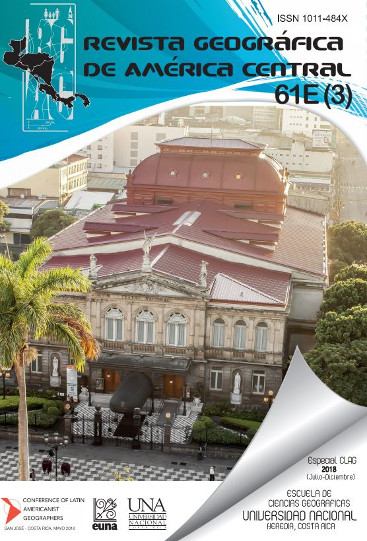Permaculture demonstration sites in Central America: contributions to agroecological transition and implications for educators
DOI:
https://doi.org/10.15359/rgac.61-3.6Palavras-chave:
Agroecology, permaculture, Central America, sustainability.Resumo
Central America has been an important region for the agroecological revolution, building on a history of intensive smallholder farming practices, farmer-to-farmer knowledge sharing and agrarian social movements. Permaculture is an approach to ecological site design and agroecological transition, which has grown in popularity in Central America in recent years. Permaculture’s entrance into the larger movement for agroecology in Central America raises some important questions. How does permaculture intersect with these existing forces? How can permaculturalists address perceptions that it is yet another colonialist development intervention by well-meaning Northerners? What are the implications for educators who visit permaculture demonstration sites with students? In order to explore these questions and to contribute to discussions regarding permaculture’s contribution to agroecological transition in Central America I visited two permaculture demonstration sites and participated in site tours. I discussed site features with farmers and gathered information from farm websites. I bring these experiences into conversation with the academic literature on agroecology and permaculture. I conclude that permaculture sites make valuable contributions to agroecological transition in Central America. I also identify important risks that sustainability educators using permaculture demonstrations sites should be aware of and I offer suggestions for addressing these risks.
Referências
Altieri, M. A. (2018). Agroecology: the science of sustainable agriculture. CRC Press.
Altieri, M. A., & Nicholls, C. I. (2017). Agroecology: a brief account of its origins and currents of thought in Latin America. Agroecology and Sustainable Food Systems, 41(3-4), 231-237.
Altieri, M. A., & Toledo, V. M. (2011). The agroecological revolution in Latin America: rescuing nature, ensuring food sovereignty and empowering peasants. Journal of Peasant Studies, 38(3), 587-612.
Bunch, R. (1999). More productivity with fewer external inputs: Central American case studies of agroecological development and their broader implications. Environment, Development and Sustainability, 1(3-4), 219-233.
Bunch, R., & Scarborough, V. (1998). People-centered agricultural development: Principles of extension for achieving long-term impact. Lutz E. Agriculture and the environment: Perspectives on sustainable rural development. Washington, DC: World Bank, 145-155.
Caradonna, J. L., & Apffel-Marglin, F. (2017). The regenerated chacra of the Kichwa-Lamistas: an alternative to permaculture?. AlterNative: An International Journal of Indigenous Peoples, 1177180117740708.
Chambers, R. (1994). Foreword in Beyond farmer first: rural people’s knowledge, agricultural research and extension practice. Intermediate Technology Publications.
Copeland, N. (2018). Meeting peasants where they are: cultivating agroecological alternatives in neoliberal Guatemala..The Journal of Peasant Studies, 1-22.
Edelman, M., Weis, T., Baviskar, A., Borras Jr, S. M., Holt-Giménez, E., Kandiyoti, D., & Wolford, W. (2014). Introduction: critical perspectives on food sovereignty. Journal of Peasant Studies, 41(6), 911-931.
Ferguson, R. S., & Lovell, S. T. (2014). Permaculture for agroecology: design, movement, practice, and worldview. A review. Agronomy for Sustainable Development, 34(2), 251-274.
Ferguson, R. S., & Lovell, S. T. (2015). Grassroots engagement with transition to sustainability: diversity and modes of participation in the international permaculture movement. Ecology and Society, 20(4).
Holt-Giménez, E. (2006). Campesino a campesino: voices from Latin America's farmer to farmer movement for sustainable agriculture. Food First Books.
Holt-Giménez, E., & Altieri, M. A. (2013). Agroecology, food sovereignty, and the new green revolution. Agroecology and sustainable Food systems, 37(1), 90-102.
Holt-Gimenez, E. & Patel, R. (2009). Food Rebellions! Crisis and the Hunger for Justice. Food First Books and Pambazuka Press.
Lockyer, J., & Veteto, J. R. (Eds.). (2013). Environmental anthropology engaging ecotopia: bioregionalism, permaculture, and ecovillages (Vol. 17). Berghahn Books.
Holmgren, D., & Mollison, B. (1978). Permaculture one. International Tree Crop Institute USA.
Holmgren, D. (2002). Principles & pathways beyond sustanability. Holmgren Design Services, Hepburn.
Mathewson, K. (1984). Irrigation horticulture in highland Guatemala: the tablon system of Panajachel. Westview Press.
Millner, N. (2016). Food sovereignty, permaculture and the postcolonial politics of knowledge in El Salvador.Postcolonialism, indigeneity and struggles for food sovereignty: alternative food networks in the subaltern world. London: Routledge, 81-105.
Millner, N. (2017). “The right to food is nature too”: food justice and everyday environmental expertise in the Salvadoran permaculture movement. Local Environment, 22(6), 764-783.
Mollison, B. (1988). Permaculture: a designer's manual. Tagari.
Rosset, P. M., Machín Sosa, B., Roque Jaime, A. M., & Ávila Lozano, D. R. (2011). The Campesino-to-Campesino agroecology movement of ANAP in Cuba: social process methodology in the construction of sustainable peasant agriculture and food sovereignty. The Journal of peasant studies, 38(1), 161-191.
Rosset, P. M., & Martínez-Torres, M. E. (2012). Rural social movements and agroecology: context, theory, and process. Ecology and society, 17(3).
Taylor Aiken, G. (2017). Permaculture and the social design of nature. Geografiska Annaler: Series B, Human Geography, 99(2), 172-191.
Trauger, A. (2017). We Want Land to Live: Making Political Space for Food Sovereignty (Vol. 33). University of Georgia Press.
Wilken, G. C. (1990). Good farmers: Traditional agricultural resource management in Mexico and Central America. Univ of California Press.
Downloads
Publicado
Como Citar
Edição
Seção
Licença
Política proposta para revistas que oferecem Acesso Aberto
Os autores que publicam nesta revista concordam com os seguintes termos:
a. Os autores mantêm os direitos autorais e garantem à revista o direito de ser a primeira publicação do trabalho, sob a Licença Creative Commons https://creativecommons.org/licenses/by-nc-sa/4.0/deed.es, que permite que outros compartilhar com reconhecimento da autoria do trabalho e da publicação inicial nesta revista.
b. Os autores podem estabelecer separadamente acordos adicionais para a distribuição não exclusiva da versão do trabalho publicado na revista (por exemplo, colocá-la em repositório institucional ou publicá-la em livro), com reconhecimento de sua publicação inicial nesta revista. Esses acordos adicionais devem respeitar os termos da licença: ou seja: não envolver lucro e compartilhar com a mesma licença.
c. Os autores são incentivados a arquivar a versão/PDF pós-impressão ou do editor em repositórios de acesso aberto.






 REVGEO está licenciado sob https://creativecommons.org/licenses/by-nc-sa/4.0/deed.es
REVGEO está licenciado sob https://creativecommons.org/licenses/by-nc-sa/4.0/deed.es
.svg_4.png)

_(1).png)
_(1)_(1)_(1)_1.png)
(2)(1)(1)(1).png)
